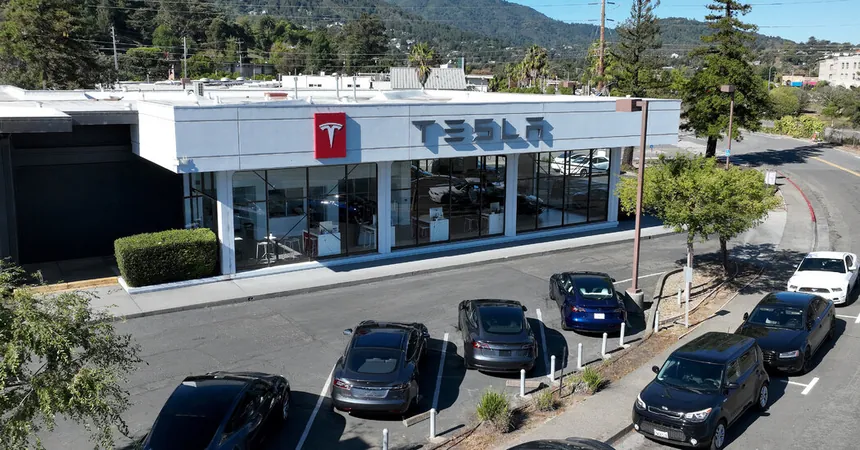
Tesla Faces First Annual Sales Decline Amidst Growing Competition
2025-01-02
Author: Yan
Introduction
In a surprising turn of events, Tesla has reported its first annual sales decline since the company's inception, highlighting the increasing pressure from competitors in the electric vehicle (EV) market. In 2024, Tesla delivered 1,789,226 vehicles, marking a slight drop from 1,808,581 units sold in 2023.
Record Deliveries vs Annual Decline
Despite achieving record deliveries in the fourth quarter of 2024—495,570 vehicles compared to 484,507 in the last quarter of 2023—these numbers didn't offset the overall annual decline. The staggering growth of rivals has provided consumers with more options, making it difficult for Tesla to maintain its dominant position in the market.
Competitive Landscape
Electric vehicle manufacturers from China, Europe, and the U.S. are flooding the market with competitive models, with BYD emerging as a significant challenger. BYD sold approximately 1.76 million electric vehicles in 2024, a notable increase from 1.6 million the previous year. Unlike Tesla, BYD benefits from a diverse product line that includes popular plug-in hybrids, which have gained traction in the Chinese market. In total, BYD sold 2.49 million hybrids in 2024, up from 1.44 million in 2023.
Market Share and Consumer Preferences
While Tesla remains a leader in the EV sector—accounting for nearly half of all electric cars sold in the United States—automakers like General Motors, Kia-Hyundai, Volkswagen, and BMW are introducing innovative designs at competitive prices, which have also contributed to the shift in consumer preferences.
Overall Market Growth
Interestingly, even as Tesla's sales were declining, the overall electric vehicle market grew by 25% globally within the same period. Analysts were expecting minimal growth for Tesla, given reports of declining sales across its key markets—namely the U.S., Europe, and China. This reaction comes despite the rising consumer interest in electric vehicles overall, as per research firm Rho Motion.
Investor Outlook
Investors appear to be looking past these sales figures, focusing instead on Tesla's ambitious ventures into autonomous vehicle technology and emerging interests like humanoid robots. Additionally, Tesla's energy division reported remarkable growth, with battery sales soaring by 60% from the previous quarter and fourfold year-on-year, illustrating significant demand for home and business energy storage solutions.
Stock Market Response
The stock market's response to Tesla's annual sales figures wasn't as drastic as one might expect, despite shares dropping by 6% on the day of the announcement. This follows a steep rise in share prices since early November, influenced by speculation that President-elect Donald J. Trump will eliminate regulatory hurdles for self-driving vehicles, a key part of Musk's vision for Tesla's future. In fact, Musk has contributed over $250 million to support Trump's campaign, positioning himself as a key advisor.
Concerns from Financial Experts
However, some financial experts express caution regarding Tesla’s stock valuation. Leonard Kostovetsky, an associate professor of business at Baruch College, stated, "Tesla is not making nearly enough money to justify the share price. The current valuation is more based on future potential rather than present realities."
Political Implications
Moreover, Musk's political affiliations and support for Trump might alienate some Tesla buyers, primarily those who lean left on the political spectrum. Despite these concerns, Musk believes that potential changes to federal subsidies and tax credits will ultimately hurt competitors more than Tesla, showcasing his confidence in the brand’s ability to adapt in a rapidly evolving market.
Conclusion
As Tesla navigates these turbulent waters, the question remains: Can they hold on to their crown as the leader in electric vehicles, or will the competition seize this opportunity to surge ahead? Stay tuned as the EV landscape continues to evolve.




 Brasil (PT)
Brasil (PT)
 Canada (EN)
Canada (EN)
 Chile (ES)
Chile (ES)
 Česko (CS)
Česko (CS)
 대한민국 (KO)
대한민국 (KO)
 España (ES)
España (ES)
 France (FR)
France (FR)
 Hong Kong (EN)
Hong Kong (EN)
 Italia (IT)
Italia (IT)
 日本 (JA)
日本 (JA)
 Magyarország (HU)
Magyarország (HU)
 Norge (NO)
Norge (NO)
 Polska (PL)
Polska (PL)
 Schweiz (DE)
Schweiz (DE)
 Singapore (EN)
Singapore (EN)
 Sverige (SV)
Sverige (SV)
 Suomi (FI)
Suomi (FI)
 Türkiye (TR)
Türkiye (TR)
 الإمارات العربية المتحدة (AR)
الإمارات العربية المتحدة (AR)